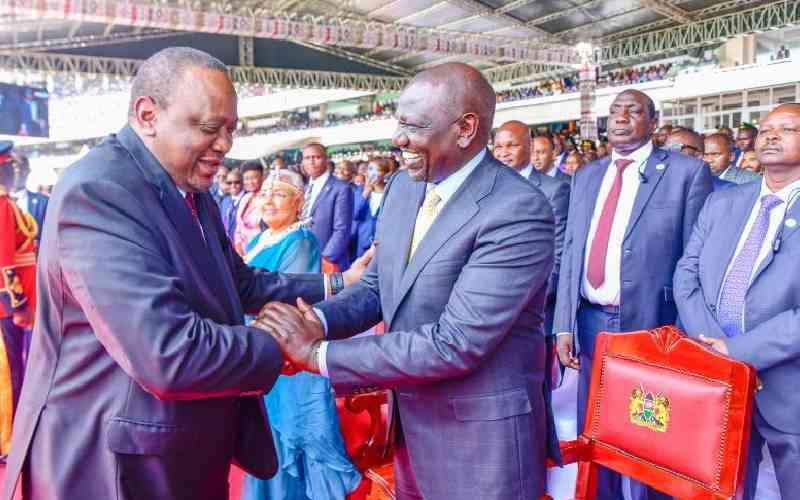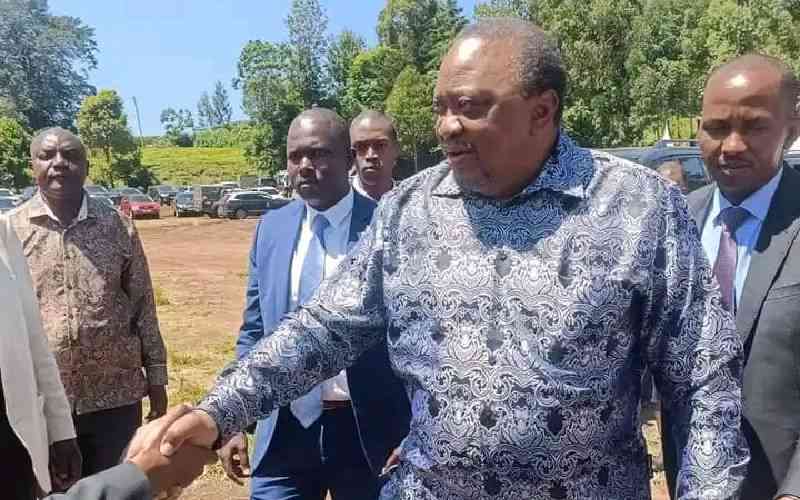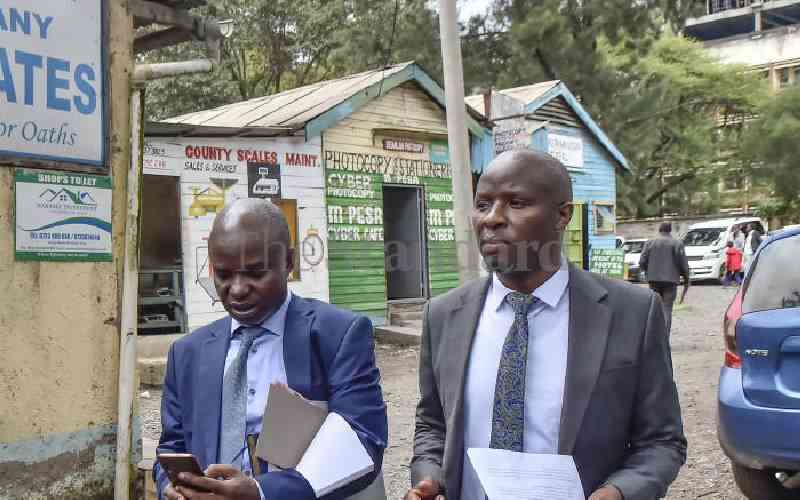President Uhuru Kenyatta yesterday led the ruling coalition’s Parliamentary Group (PG) retreat in Naivasha to endorse a new political outfit that will serve as their re-election vehicle, amid hiccups and confusion among Jubilee-allied legislators.
Even as the President sought to put the matter to rest, it was evident that disagreements over the matter were still alive. Addressing the legislators, Kenyatta reminded them of the impact of negative ethnicity in the country and emphasised that the new party would seek to neutralise tribal politics. “This is the party. There is no other party. Jubilee Alliance Party is the only party to unite this country and our supporters,” said the Jubilee leader.
Before the President showed up, The Standard on Sunday team established that members had decided to steer clear of discussing the itchy issue of JAP, opting instead to get direction from the ruling Coalition’s leaders, President Kenyatta and Deputy President William Ruto. The United Republican Party (URP) leader did not however attend as he is away in Davos, Switzerland on official duty.
Nonetheless, what do the emerging rifts and suspicions within the ruling Jubilee coalition rank and file over the new political kid on the block, portend for the new party?
Since news of its formation filtered out last weekend, JAP has failed to receive an overwhelming approval from the entire Jubilee family, thus casting doubts on its future. This is partly why out of the Naivasha retreat, a committee of seven people has been formed to iron out sticky issues surrounding JAP’s formation. Those in attendance in Naivasha also included legislators from smaller parties, that signed post-election agreements with the main Jubilee partners (TNA and URP) after the March 4, 2013 general elections.
Moi University law lecturer Titus Bittok says the formation of JAP came too early and apart from smaller parties that are friendly to Jubilee opposing the move, URP was equally uncomfortable.
“There is a strong feeling in URP’s Rift Valley stronghold that their party will be swallowed, and that their bargaining power in government will be curtailed. The grassroot in that region is not ready for JAP,” Bittok, who is also an advocate of the High Court told The Standard on Sunday.
While the Registrar of Political Parties (RPP) Lucy Ndungu told The Standard on Sunday that JAP was just as distinct as TNA and URP, with its own officials, some Jubilee leaders are on record calling for dissolution of existing parties within the coalition.
In Naivasha, small parties affiliated to the Jubilee coalition opposed the ruling coalition’s move to form JAP, citing lack of proper consultations.
They complained that they have been sidelined in the coalition despite their support in Parliament during the passing of key Bills. Alliance Party of Kenya (APK) leader, Meru County Senator Kiraitu Murungi, said there must be enough consultations over the new party involving all Jubilee affiliate parties.
Kiraitu demanded interests of all the constituent parties should be catered for and its structure explained to members.
There is greater acceptance of the new party among TNA leaders in Central Kenya compared to the URP dominated Rift Valley.
In Nyeri County for example, Kieni MP Kanini Kega and TNA county chairman Thuo Mathenge are already jostling over the leadership of JAP.
However, it’s a total contrast to Rift Valley where Bomet Governor and Council of Governors (CoG) chairman Isaac Ruto has flatly dismissed JAP and even called for resignation of President Uhuru Kenyatta and his Deputy William Ruto over the formation of the party.
Ruto, who belongs to URP and was among its founders, had this to say: “This is what we have been saying all along, URP is conducting itself in an unruly manner and you can see where it is heading now.”
Stay informed. Subscribe to our newsletter
The governor warned that the move was going to cause chaos within Jubilee. “The move is going to cause a lot of chaos since some of us who are legitimate do not know where we are now or where we will be and Jubilee will have to blame itself for the mess,” he said.
Another strong voice to oppose the move within URP is that of Mandera County Senator Billow Kerrow, who views the arrangement as unworkable. But why are some in URP afraid of JAP? There are questions on whether it was politically prudent for the Deputy President to agree to JAP’s formation, given he will have no political party of his own to exercise his political muscle just in case things do not work in JAP.
URP swallowed
Bittok points out that once URP is swallowed by JAP, there has to be a bigger brother and the President and his Deputy will no longer be equals at party politics level unlike now when each of them is a party leader.
Indeed, there are speculations while President Kenyatta will become the JAP party leader, Ruto will be the deputy party leader, a ladder lower.
The Deputy President’s key political allies in the region, Kericho Senator Charles Keter and Elgeyo-Marakwet Senator Kipchumba Murkomen, have rallied behind JAP.
JAP is chaired by Nelson Dzuiya with Veronica Nduati as the Secretary General while Kenyatta and Ruto’s close allies David Murathe and Caleb Kositany take the Vice Chair and the Deputy Secretary General slots respectively. Senator Keter has said JAP was meant to bring harmony amongst the two parties and avoid diverted allegiance to the different parties while Murkomen has said they were putting in place a legal framework that will ensure the new party will be used as the vehicle for Jubilee in 2017.
For those close to the Deputy President, JAP would ensure he ascends to the Presidency in 2022 when President Kenyatta retires.
Former minister and chairman of the Centre for Multi-Party Democracy (CMD) Omingo Magara, a one-time close ally of Ruto during their days in ODM, says it may not be a guarantee that Ruto will be supported in 2022.
“Politics is dynamic and you cannot plan now for what will happen in 2022. You can only cross the bridge when you reach there,” Magara, the leader of the People’s Democratic Party (PDP) which is allied to the Jubilee coalition told The Standard on Sunday. Majority Leader in the National Assembly Aden Duale said JAP will absorb all Jubilee affiliate parties come 2017 and those in contention will have already joined the party.
“The formation of the party is in order to have a stronger political movement which will deepen the unity of our people and provide a powerful national force in the national leadership,” said Duale. According to Duale, the PG shall consult all constituent and affiliate parties in developing a roadmap towards the ultimate merger into the new party.
Duale and the Senate Majority leader Prof Kithure Kindiki said that the coalition’s legislators had unanimously endorsed the formation of the party. “This new party will be a formidable force in the next general elections. In the meantime, we are going on with the process of consultations among our constituent and affiliate parties,” said Prof Kindiki.
He continued, “This will give us time to market the party and engage in further consultations with the electorate. We have decided to field one candidate in the Kajiado Central parliamentary by-election to test how we will work in future.”
Sources who attended the closed-door meeting, reiterated that the President did not mince his words, in regard to the new party, stressing that it was the party to watch in 2017.
Other issues that emerged at the Naivasha retreat included the frosty relationship between Parliament and the Executive, sibling rivalry between the National Assembly and the Senate, the Kajiado Central by-election, the pending International Criminal Court (ICC) cases against Ruto and former journalist Joshua Sang.
The lawmakers reviewed the status of the implementation of the Jubilee Manifesto, which they said meet expectation so far and pledged to fast-track the pending issues in the next two years.
They resolved to strengthen the legislative agenda to ensure by 2017 the alliance will have an exemplary score card to present to the electorate.
Revisiting the Sky-team issue, Duale came to the defence of his colleagues accused of being members of the team, saying they are not at fault.
“Those complaining are envious of the progress of some MPs. The President has full confidence in their leadership and at no point have they been facilitated to represent the interest of the coalition,” said the Garissa Town MP. During the meeting, Cabinet Secretaries were not spared the wrath of the legislators who accused them of looking down on elected leaders especially the Parliamentary committee chairpersons.
After discussion, it was agreed that an eight member liaison committee comprising five MPs and three Senators be constituted to look into how the two arms of government can have a seamless relationship. “The committee will consist of eight members and will be mandated to look into the challenges faced under the leadership of the President and his deputy to end the existing row,” said Duale.
Further the meeting resolved that the Jubilee National Assembly and Senate PG shall work as a single team with full unanimity and co-operation at both Houses.
Senator Kimani Wamatangi (Kiambu) welcomed the latest development, saying it will enhance the implementation of Jubilee Manifesto.
— Additional reporting by Stephen Mkawale and Robert Kiplagat
 The Standard Group Plc is a
multi-media organization with investments in media platforms spanning newspaper
print operations, television, radio broadcasting, digital and online services. The
Standard Group is recognized as a leading multi-media house in Kenya with a key
influence in matters of national and international interest.
The Standard Group Plc is a
multi-media organization with investments in media platforms spanning newspaper
print operations, television, radio broadcasting, digital and online services. The
Standard Group is recognized as a leading multi-media house in Kenya with a key
influence in matters of national and international interest.
 The Standard Group Plc is a
multi-media organization with investments in media platforms spanning newspaper
print operations, television, radio broadcasting, digital and online services. The
Standard Group is recognized as a leading multi-media house in Kenya with a key
influence in matters of national and international interest.
The Standard Group Plc is a
multi-media organization with investments in media platforms spanning newspaper
print operations, television, radio broadcasting, digital and online services. The
Standard Group is recognized as a leading multi-media house in Kenya with a key
influence in matters of national and international interest.







